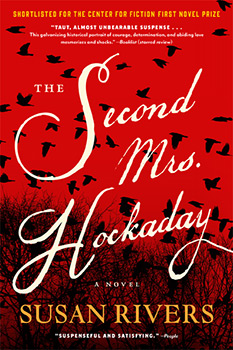Reading Guide Questions

Please be aware that this discussion guide will contain spoilers!
- Why is the story told in documents — letters, inquest reports, and diary entries — rather than a continuous narrative from one point of view? What do you think the writer intended to achieve by using this approach to the story? How does it affect a reader's relationship to the story?
- Placidia agrees to marry Major Gryffth Hockaday after knowing him for less than a day — a short engagement, even by war - time standards. What do you think motivates her to accept his proposal and exchange the security of her home for an unknown adventure with this man? What does she mean when she says to her cousin Mildred, and, later, to her children, that "life is all about the leaps" (pages 12 and 214)?
- Discuss the role played in the novel by the ghost of the first Mrs. Hockaday. Why do you think she haunts Holland Creek? What does her relationship with Placidia tell you about the second Mrs. Hockaday?
- Before the Civil War, it was customary among white slave-owners to refer to their slaves as "servants" and to give them names derived from Roman literature and history, as well as from the Bible. Why do you think white Southerners were motivated to do this?
- Placidia seems to have a close relationship with her father, Quincey Valois Fincher, but her perception of him changes when she discovers that he fathered a child with a slave girl while Placidia's mother was alive and allowed that child to be sold away. In light of recent genetic evidence showing that many of our country's founding fathers, including Thomas Jefferson and George Washington, maintained "shadow" families of mixed-race descendants on their plantations, discuss the significance of this part of America's history. How do you think high-society Americans in the eighteenth and nineteenth centuries rationalized the sexual exploitation of enslaved African American women?
- Without identifying the person who buried her infant's body, Placidia tells the officials conducting the inquest that she asked that person to wrap the newborn in a piece of her knitting and bury him in the first Mrs. Hockaday's sewing box, because she "could not bear for him to go into the next life unaccompanied by any mementoes of loving attachment in this one" (page 79). What does this tell you about Placidia's feelings toward the baby? Discuss what kind of emotional state you believe she was in at the time of the child's death
- Many people in Holland Crossroads believe that Placidia murdered her infant son before burying him on the farm, but no one involved in the case can determine how the baby died or who might have been responsible. Placidia denies harming the baby. What version of events do you believe? How did the child die, and why?
- Discuss Gryffth Hockaday's state of mind as you interpret it from his letters to Placidia. How do his views on the war appear to change as he survives more and more brutal warfare? How does he view his own responsibility as a field officer to his regiment of infantry soldiers? How does he view his responsibility to Placidia, left alone on the farm?
- One recurring motif in the novel is the story of Adam and Eve being expelled from Paradise. What elements does Placidia's story share with Eve's? What "fruit" does she eat from the Tree of Knowledge, and how does it change her?
- At one point in her diary Placidia comments on her stepsister Agnes Oglesby's dislike of her, saying, "I perceived that nothing Agnes valued was held in high regard by me. That was the injury I caused her as well as the leverage I brandished" (page 181). How does this statement characterize the relationship between the two women?
- Placidia's grown son, Achilles Hockaday, is repeatedly instructed by his father to burn the copy of David Copperfield that contains Placidia's wartime diary. However, like Pandora in the Greek myth, Achilles is unable to comply. Discuss Achilles's decision to read his mother's diary. Would you have done the same?
- Roberta "Roe" Jones, Mildred's daughter, is heartbroken when Achilles Hockaday breaks off his involvement with her and leaves Memphis for Philadelphia. What does Roe mean when she writes that she should have seen this coming, because it was her own hamartia — a fatal flaw in her character — that invited this disaster? How do you feel about Achilles's treatment of Roe, and why do you think he was courting her in the first place?
- Allusions are made in the novel to Virgil's Aeneid , which tells the story of Aeneas, a Trojan who survived the sacking of his city by the Greeks. He traveled the ancient world doing battle with his enemies and ventured into the underworld to visit the dead before finally settling in Italy and founding the Roman Empire. The African American Achilles relates strongly to Aeneas, as does his namesake, Achilles Hockaday. Discuss why the two men see themselves in this role. And what is the significance of this passage quoted by Achilles Hockaday: "All night long, all day, the doors of dark Hades stand open, / But to retrace the path, to come up to the sweet air of Heaven, / That is labor indeed" (page 217)?
- Placidia's final entry in her diary is also the conclusion of the novel. Do her final words and images leave you hopeful? Sad? Enlightened? Conflicted? What do you think she means by the statement "Paradise . . . costs too much" (page 254)?
Unless otherwise stated, this discussion guide is reprinted with the permission of Algonquin Books.
Any page references refer to a USA edition of the book, usually the trade paperback version, and may vary in other editions.






